What wicked wonders await us in the next season of the hit series, House of Cards? If you’ve been binge watching, you know that the main character, Frank Underwood, played by Kevin Spacey, is a politician with some violently strong management methods.
With Season 3 of House of Cards premiering on Netflix on February 27, 2015, it’s time to reflect on the cunning tips that Frank Underwood has shared about leadership, power, and managing all the cards in the deck.
Now, don’t take everything that Frank says under advisement if you’re looking for management lessons. The man is a demon…or is he just a politician? That’s a plot twist that hasn’t been explored yet.
Can you really get useful management advice from a cold-hearted manipulator like Frank Underwood? Let’s find out.
(No need to worry if you haven’t watched the show. The quotes below aren’t plot spoilers, though they do reveal some of Frank Underwood’s depraved character qualities.)
1.
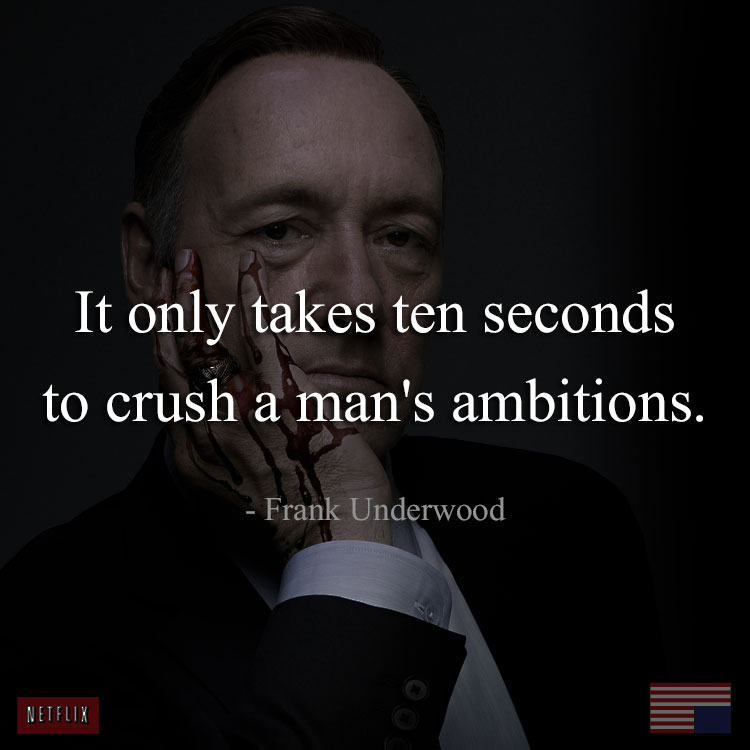 Whether you’re leading a team of one or a team of hundreds, your first obligation is to the people you manage. Pick people up instead of putting them down. Never ask anyone to do something that you wouldn’t be willing to do yourself. And, simply, be nice—nice doesn’t mean you have to be friends, but don’t condescend, don’t take your feelings out on anyone, and treat people with respect, even if you need to reprimand them.
Whether you’re leading a team of one or a team of hundreds, your first obligation is to the people you manage. Pick people up instead of putting them down. Never ask anyone to do something that you wouldn’t be willing to do yourself. And, simply, be nice—nice doesn’t mean you have to be friends, but don’t condescend, don’t take your feelings out on anyone, and treat people with respect, even if you need to reprimand them.
2.
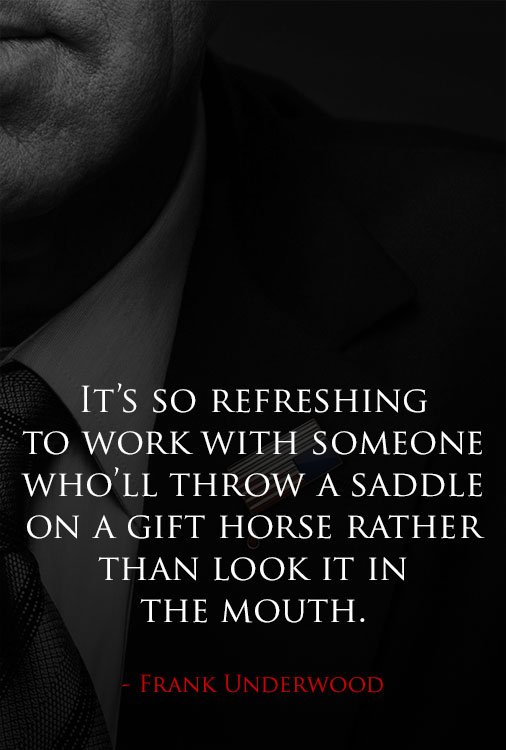 Leaders shouldn’t surround themselves with Yes Men (or Yes Women for that matter). To manage effectively, you want to work with people who can spot new opportunities as easily as they can overcome obstacles, and who will also offer you an informed opinion when their honest input is needed. Pessimists can serve a purpose in a team, if they understand that the real power of pessimism is the ability to spot a problem before it becomes a crisis. Pessimists, cynics, and realists all need a leader’s guidance to use their insight for good.
Leaders shouldn’t surround themselves with Yes Men (or Yes Women for that matter). To manage effectively, you want to work with people who can spot new opportunities as easily as they can overcome obstacles, and who will also offer you an informed opinion when their honest input is needed. Pessimists can serve a purpose in a team, if they understand that the real power of pessimism is the ability to spot a problem before it becomes a crisis. Pessimists, cynics, and realists all need a leader’s guidance to use their insight for good.
3.
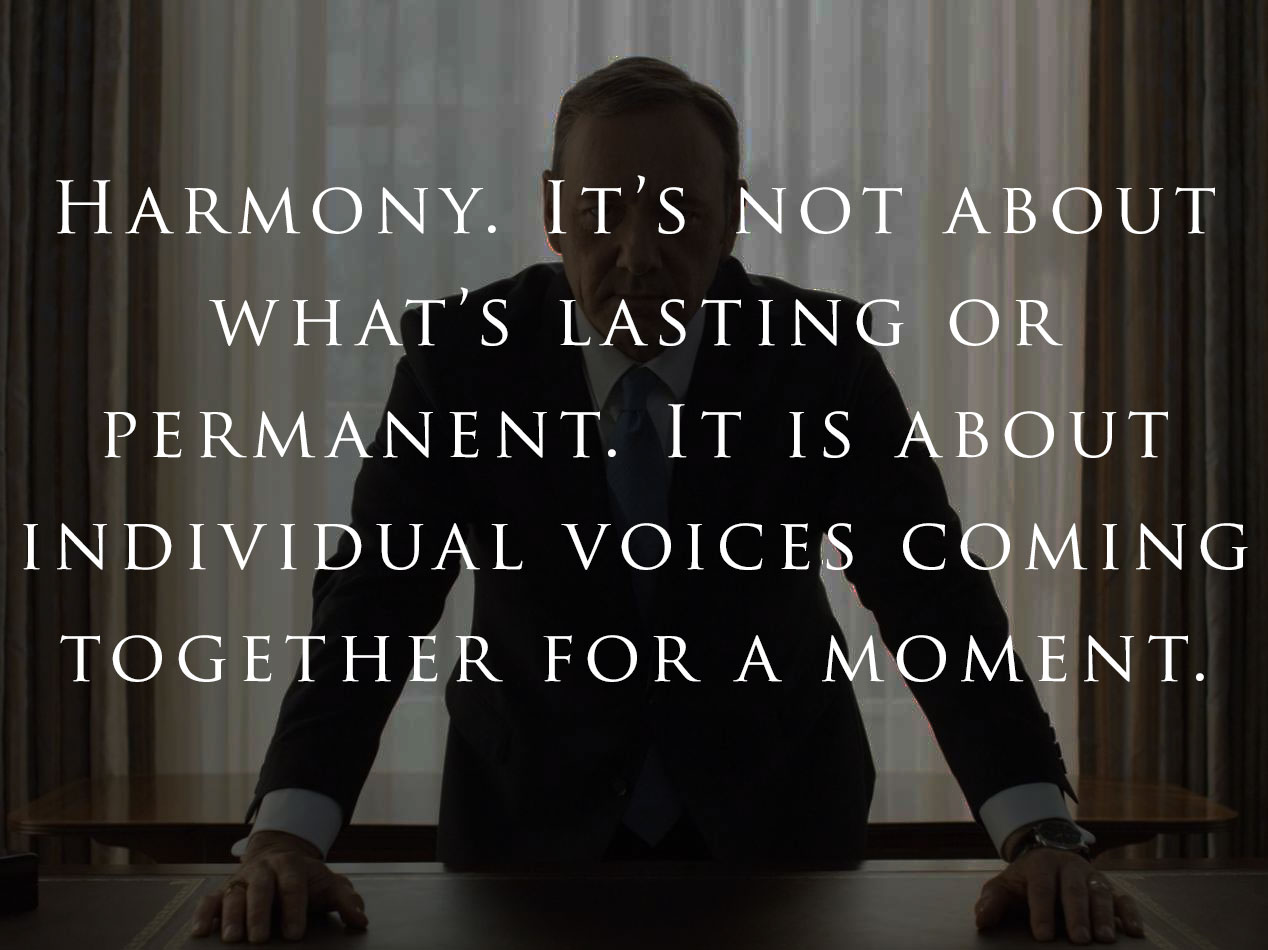 There’s nothing more constant than change. Your team may be pulled in many different directions and your team’s shared and individual priorities, and even job descriptions, may need to change frequently. What really matters is how you manage your team to come together when it needs to and in the way it needs to. Your team’s harmony in the moments that demand it will depend on your nimble and adaptive leadership skills.
There’s nothing more constant than change. Your team may be pulled in many different directions and your team’s shared and individual priorities, and even job descriptions, may need to change frequently. What really matters is how you manage your team to come together when it needs to and in the way it needs to. Your team’s harmony in the moments that demand it will depend on your nimble and adaptive leadership skills.
4.
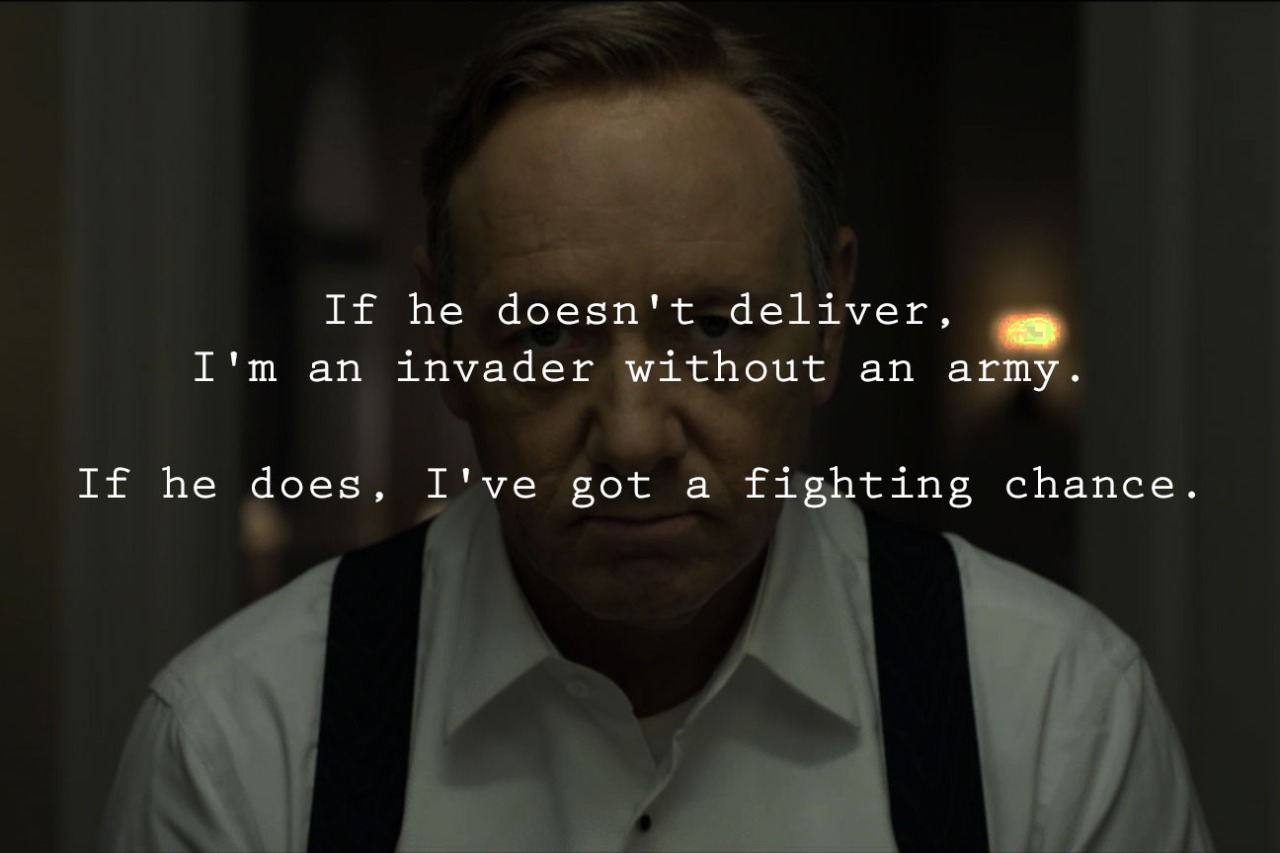 As a leader you are only as good as the people who work for you. They—and the quality of their work, their attitudes toward the job, and their successes—upholds and even uplifts your stature. Put your energy into making all the people on your team into great fighters in your army.
As a leader you are only as good as the people who work for you. They—and the quality of their work, their attitudes toward the job, and their successes—upholds and even uplifts your stature. Put your energy into making all the people on your team into great fighters in your army.
5.
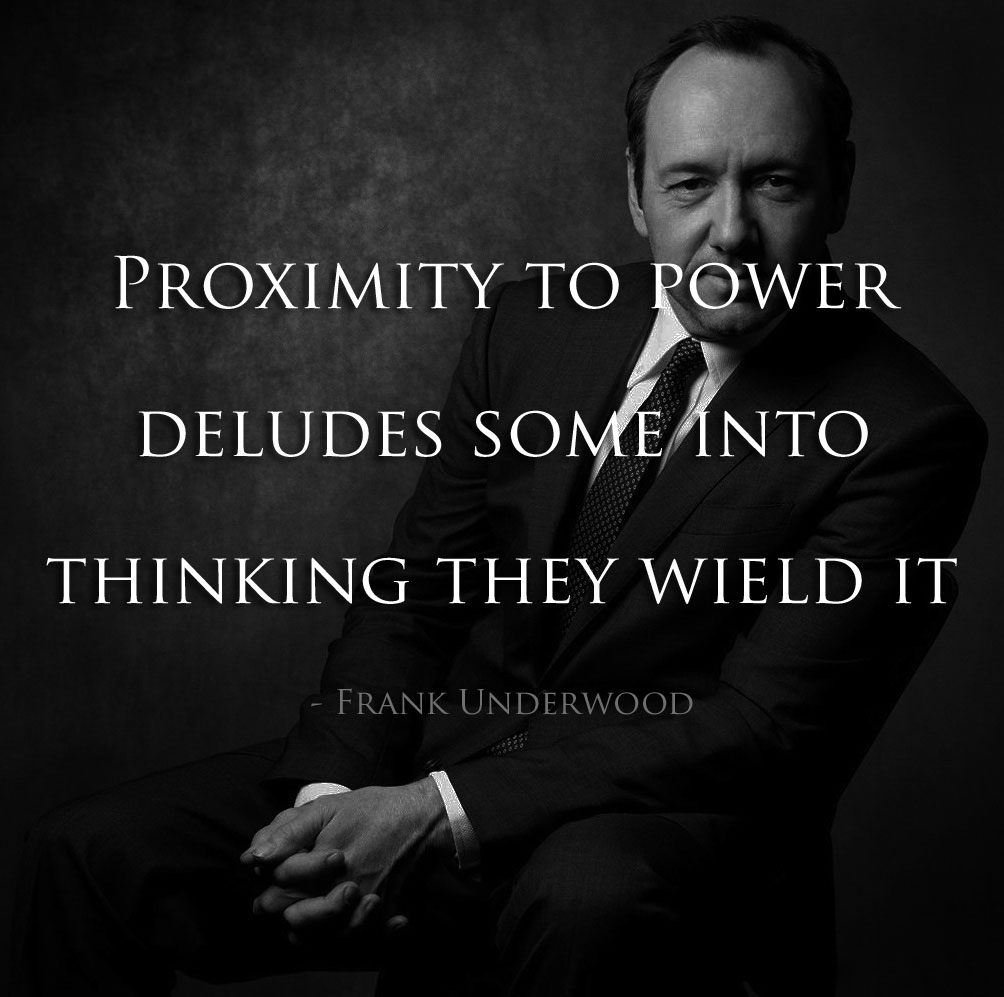 Don’t let your authority go to your head. Set standards of behavior for yourself the same as you do for the other people on your team. Don’t overestimate the sway you yield and even if you have a lot of power, use it with care. Power manifested too strongly can easily transform into arrogance.
Don’t let your authority go to your head. Set standards of behavior for yourself the same as you do for the other people on your team. Don’t overestimate the sway you yield and even if you have a lot of power, use it with care. Power manifested too strongly can easily transform into arrogance.
6.
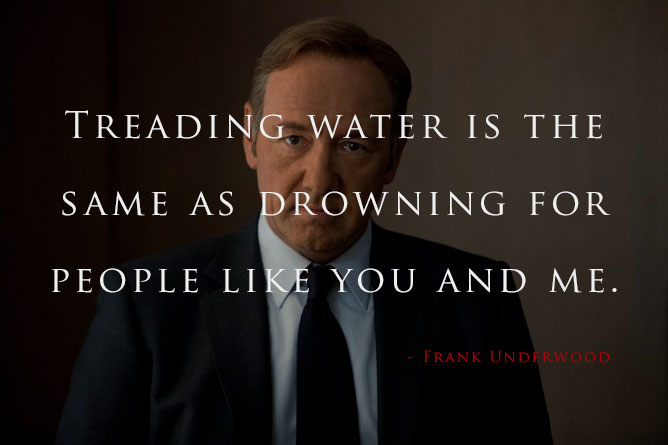
Stasis demotivates as much as a lack of clarity. Set SMART goals for your team—goals that are Specific, Measurable, Attainable, Relevant, and Thrilling (yes, I know, T usually stands for time-bound, but just mush that into measurable to free up the T). If your goals are thrilling that means you won’t be treading water, you’ll be invigorating your team to rise to the surface and possibly even walk on water.
7.
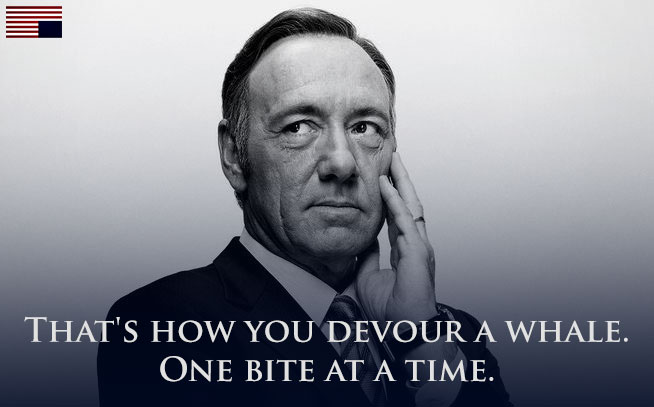
Your job isn’t to do all the work or, worse, micromanage. Your job is to set a path for your team that helps them reach your shared goals, no matter how ambitious and whale-sized those goals are. You need to set the path and uphold the vision, and also give your team the tools and confidence that can empower them to charge forward. To keep them energized, you’ll need to get their input on the plan you set, provide ongoing clarity and feedback, and back it all up with trust and accountability.
8.
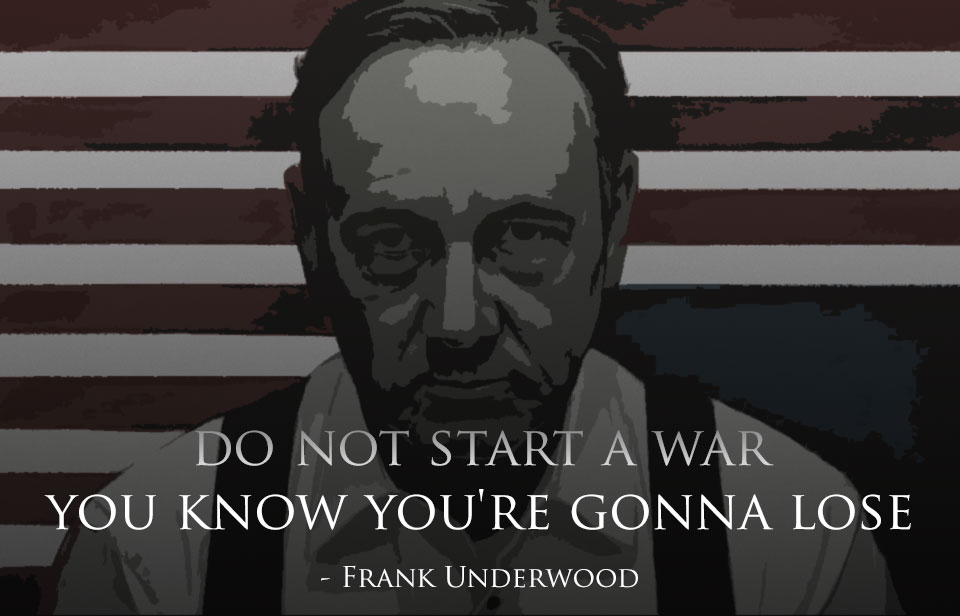
You must pick your battles wisely. Pick the wrong battles and you’ll waste energy and diminish the good will people have for you. It’s not about courting and counting favors, or playing favorites, it’s about knowing that all the resources you manage are always limited. Put your energy toward the decisions and battles that matter most.
9.
 If you want to have influence and be a leader, you need to bring others along for the ride. As those you surround yourself with rise, so will you. Open doors for them, guide them up the ladder, and help them gain the skills and experience that can make them stronger assets to your team or for wherever they go next. Most importantly, always say “thank you” to the people who have had your back—and to those who have kept others from stabbing you in the back.
If you want to have influence and be a leader, you need to bring others along for the ride. As those you surround yourself with rise, so will you. Open doors for them, guide them up the ladder, and help them gain the skills and experience that can make them stronger assets to your team or for wherever they go next. Most importantly, always say “thank you” to the people who have had your back—and to those who have kept others from stabbing you in the back.
Lauren Girardin is a marketing and communications consultant, writer, and trainer. Find her on Twitter at @girardinl.





Good tips but you did not need to use the gory pictures.
Great Show! Great Quotes! But Mr Underwood shows exactly why nothing really gets done for the common good in Washington. The underlying question about House of Cards is, to whom does people like Mr Underwood really serve?
Very creative and engaging. I like the twist on using a “shady” character to engage our interest in reading and at looking at ways to improve our team. Not all new information here but a new way of looking at it. Thanks.
You’re welcome, Julie! I enjoy kick-starting new thinking by sharing ideas in surprising ways.
Thank you for the analogies. I can understand the appeal of shows and other media in the portayal of worst case scenarios or even scenarios that most of us would not even consider. And it is perhaps the extreme that draws us to these shows. However, most of these shows are just fictional. I would lean towards the tried and true methods (to include shortcomings) of past and present world leaders, business leaders, social reformers, etc. as my personal and preferred references for lessons and ideas.
I disagree that “Whether you’re leading a team of one or a team of hundreds, your first obligation is to the people you manage.” Your first obligation is to the people that pay your salary, or put you in power. In the Federal Government that means the tax paying customers. It’s our job to ensure that the customer gets all of the unemployment checks they deserve, for as long as they deserve, and not a penny or a week more. In politics it means your constituents. Politicians owe them their loyalty and their wisdom.
Also I would study best practices of most effective organizations, that are not necessarily Federal ones. We Feds do too much paperwork and controlling when instead we should be engaging, enabling and equipping.
In my experience you are not able to effectively serve your constituents until your team is working smoothly with the right approach leadership. Managing people in a way that inspires them to produce good work is the first step toward the ultimate goal. The best way to serve is to serve well!
Hi, in point 9, is the text inspired by one of Frank monologue or by something he says in an episode ? It reminds me something but can’t find when he would say that. It would help me on a subject i’m working on. If you can help me i’ll be very thankful !
“Open doors for them, guide them up the ladder (…) Most importantly, always say “thank you” to the people who have had your back—and to those who have kept others from stabbing you in the back.”
The text in the image, “Generosity is its own form of power,” is a Frank Underwood quote. All the text beneath the image from “If you want have influence” through “stabbing you in the back” is 100% original writing by me, Lauren Girardin! Hope this clarification helps, Pauline.